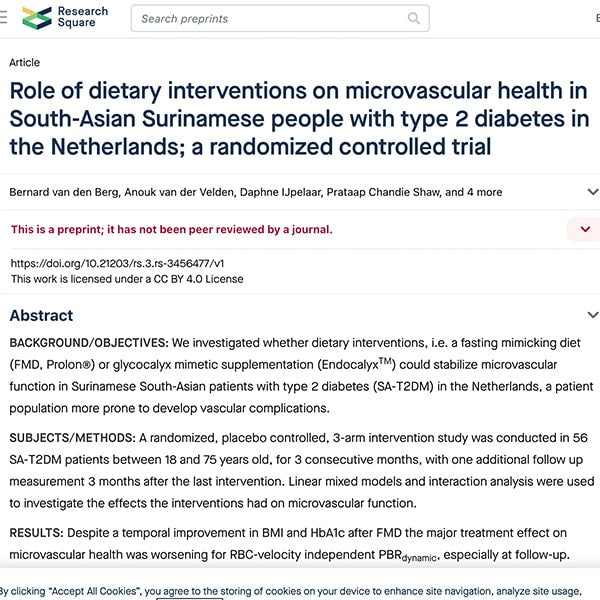
Role of dietary interventions on microvascular health in South-Asian Surinamese people with type 2 diabetes in the Netherlands; a randomized controlled trial
Share

BACKGROUND/OBJECTIVES: We investigated whether dietary interventions, i.e. a fasting mimicking diet (FMD, Prolon®) or glycocalyx mimetic supplementation (EndocalyxTM) could stabilize microvascular function in Surinamese South-Asian patients with type 2 diabetes (SA-T2DM) in the Netherlands, a patient population more prone to develop vascular complications.
SUBJECTS/METHODS: A randomized, placebo controlled, 3-arm intervention study was conducted in 56 SA-T2DM patients between 18 and 75 years old, for 3 consecutive months, with one additional follow up measurement 3 months after the last intervention. Linear mixed models and interaction analysis were used to investigate the effects the interventions had on microvascular function.
RESULTS: Despite a temporal improvement in BMI and HbA1c after FMD the major treatment effect on microvascular health was worsening for RBC-velocity independent PBR, especially at follow-up. Glycocalyx supplementation, however, reduced urinary MCP-1 presence and improved both PBR and MVHS, which persisted at follow-up.
CONCLUSIONS: We showed that despite temporal beneficial changes in BMI and HbA1c after FMD, this intervention is not able to preserve microvascular endothelial health in Dutch South-Asian patients with T2DM. In contrast, glycocalyx mimetics preserves the microvascular endothelial health and reduces the inflammatory cytokine MCP-1
